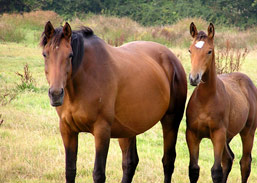Drugs are modern medicine’s answer to nearly any ailment that your horse may face, but powerful medications need to be used with caution and under the guidance of a veterinarian. Loving horse owners hate to see their animals suffer so when they are in pain or not feeling well, it is natural to want to treat them with medications that work for us or that have been prescribed to other animals at the farm. It is important to remember that horses metabolize many medications differently than we do so many of the household medications that we keep in stock are not safe for your horse. Even drugs that have been prescribed to your horse should be monitored by your vet because long term use of high doses can still create problems. Long term use of NSAIDs (non-steroidal anti-inflammatory drugs) can create problems for the liver or kidneys.
Common Drugs that Toxic to Horses:
- Inophores (Monensin – cow antibiotic)
- Pesticides
- Rodenticides
- Herbicides
Symptoms of drug toxicity in horses include decreased apatite, edema, lethargy, diarrhea, tremors, discolored gums, loss of coordination and colic.
Horse owners should always be careful to keep medications and poisons out of horses’ reach to avoid accidental ingestion. Also make sure your farm workers know to be careful of these substances around the horses. If you suspect your horse consumed a drug that is toxic to them, you should call your veterinarian immediately. Your vet will know how to respond. In some cases there are antidotes or sometimes they may need fluids.
If you veterinarian is not available, call poison control-
Pet Poison Control: 888-426-4435
Pet Poison Helpline: 855-764-7661
There may be a $65 fee for using this service, but it could save your horse’s life.
Studies
Clinical signs, laboratory changes and toxicokinetics of brodifacoum in the horse.


